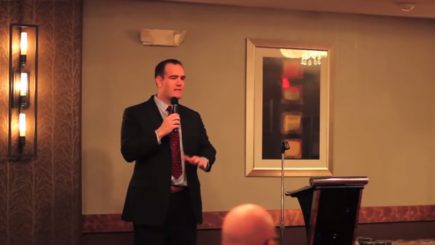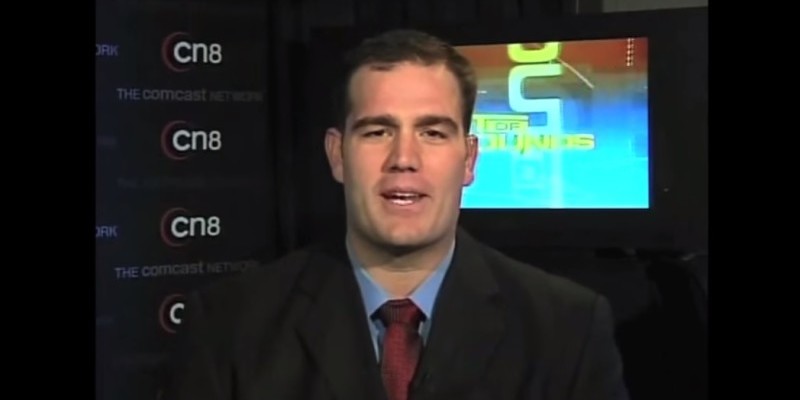Those of us who write about football are rarely ex-players or ex-coaches, and frankly that hurts our credibility with the people about whom we write. Chip Kelly didn’t even like having a non-“football guy” as his General Manager. And GM Howie Roseman — a legendary bureaucratic infighter — got kicked upstairs as a result of their death match.
Reporters complain a lot about Chip’s chilly attitude toward the media, but I suspect he’s just more honest about his feelings than other coaches. The guy obviously loves talking football with players and other coaches, from Bill Belichick to Urban Meyer and Kliff Kingsbury. His lectures to other coaches — some of whom you can find here on FishDuck — are blunt, direct and highly-detailed about exactly what he was trying to do with the Ducks. (They stopped around 2011.)
There are a couple of football writers with serious football experience, such as Matt Bowen, though the good ones tend to jump straight into broadcast journalism jobs, which we lowly scribes look to as the pot at the end of a 20-year-long-career rainbow.
Ross Tucker has the perfect Chip Kelly resume — a seven-year NFL player, smart guy (went to Princeton, two-time Academic all-American), and now a motivational speaker as well as analyst. Most importantly, he has that offensive lineman mentality, which makes sense because he was a journeyman tackle named to the USA Today “All-Joe” team in 2003.

Ross Tucker making a motivational speech.
In a recent article about “The Chip Kelly Football Experiment,” Tucker discussed Chip’s willingness to discard players who don’t buy into his program.
That’s fascinating for a guy like me, who always bought into what the coach was selling because, frankly, I didn’t have a choice. I wasn’t talented enough to go about it any other way and think I’d have a job. As such, I didn’t have a great deal of respect or sympathy for the guys who would speak out or fail to get in line and stay there. I was probably envious at times that they had the clout to be able to do what they wanted and not have to worry about their roster spot, but in the end I still couldn’t picture myself ever acting that way. It’s just not in my DNA.
Chip simply doesn’t give one-on-one interviews to reporters, aside from a couple of quick broadcast TV bits and a weekly five-minute phone call during the season with Angelo Cataldi, a big sports talk radio host in Philadelphia. The last time he gave a reporter enough time and access to profile him was in 2010, with George Schroeder of The Register Guard, not long after the Ducks hired Chip. (Schroeder now writes for USA Today.)
And yet, with hardly anyone noticing, Chip sat down a year ago with Tucker and Bill Polian, a legendary NFL executive, for an epic 17-minute chat. It’s on episode 70 of Tucker’s podcast. They went over a lot of interesting details about the Eagles’ unique training camp methods and Chip’s philosophy.
Probably because he was talking with two football guys, coach Kelly was clearly more relaxed than in any other interview I’ve ever heard. It’s definitely worth a listen.

I bring this up because I was honored to have Tucker invite me onto his podcast this past Monday to discuss Controlled Chaos, my new book about Chip Kelly and the Eagles’ 2014 season. (It’s coming out on July 28th; you can pre-order now.) Here’s an excerpt from the interview that you might find interesting:
RT: The other thing [Chip Kelly’s] betting on, clearly, is his system, and I think you touched upon it at the very start, which is just the importance of buy-in, when you move on from DeSean Jackson, LeSean McCoy, Evan Mathis. You know a lot of times in the NFL, I’ve always heard people say, you have to replace talent with talent, and certainly in the case of Evan Mathis, I don’t think that he’s done that. And to release Mathis and not get anything in return, it’s surprising to say the least.
Is that the philosophy, is it that simple that “Hey, if you’re not totally bought in with what we’re doing, then get him out of there.” Because I guess my concern is, a lot of times there are going to be players unhappy with their contract, and if it’s that easy to get released, then there’s a lot of guys who are gonna wear the wrong socks, and not go with the program, so that they get released and become a free agent.
MS: I think he really does believe in the radical idea that he doesn’t want people on the team unless they want to be there. And that he can find enough people to fit in.
It’s a particular worry, and you mentioned this in an article the other day, you’ve got Sam Bradford with a shaky knee, and then who’s your guard? What’s going to happen if people do a double A-gap blitz, and you’ve got second-, third-level people because they’re enthusiastic but your Pro-Bowl guy is gone, it’s a concern.
The thing with Evan Mathis, his agent is Drew Rosenhaus, who comes up a lot in this book, was also DeSean Jackson’s agent before he fired him. He has a particular history with the Eagles. He was also Terrell Owens‘ agent back in the day.
But earlier in the spring, and Evan Mathis has acknowledged this, he asked the Eagles to release him. Because he wants a better contract, he’s on his last contract, he’s what 33, 34? And … the Eagles weren’t going to do it.
I think he might have out-smarted himself a little, … and now he’s going “and then I stopped asking to be released,” but I think with Chip once you say you want off the team, it’s over. There’s no undoing that.
RT: Right, once you say it once, you’ve … It’s like when [Bill] Parcells would say, once a guy talks about retiring, he’s already retired.
MS: Oh, yeah. Yeah.
RT: Once a guy mentions retiring, he’s already retired.
There’s a lot more interesting discussion there. Check it out.
Feature photo of Ross Tucker from video, courtesy RossTucker.com
Related Articles:
Chip Kelly Update: Everything's Good Again ...
Chip Kelly Update: Wailing and Gnashing of Teeth
Shock and Awe -- The Oregon Ducks' Football Hangover Effect
Despite Lopsided Score, Georgia State "Never Stopped Believing"
Hope Springs Eternal for Ducks
Incompetent Pac-12 Officials: How Do You Miss ALL of THIS?
Mark Saltveit’s newest book is “Controlled Chaos: Chip Kelly’s Football Revolution” (Diversion Books, NY) has been recently released. He is the author of “The Tao of Chip Kelly” (2013) and writes on science, religion, wordplay and political scandals. He is also a standup comedian and the world palindrome champion.

